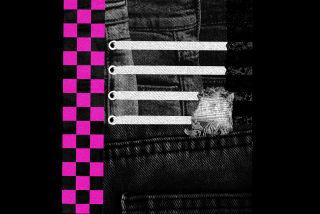Confederate Flag Still Flies, as Do Lawsuits to Shelve It
ATLANTA — The controversy over the Confederate battle flag, it seems, will never end. Now it’s getting kicked around schoolyards across the South.
In the first of at least 30 such disputes to reach the courts, a rural Georgia school district that banned students from wearing T-shirts emblazoned with the distinctive, divisive Rebel cross won the first round when a federal judge temporarily upheld the ban. But the American Civil Liberties Union has said it will press the case, claiming the policy violates the right to free speech.
“The tension over this is huge,” said Seminole County school Supt. Larry R. Bryant, who drew up the anti-flag rules for his 2,000-student district. “Unless we banned the flag, there would be violence--and lots of it.”
Despite all the soul-searching over the last few years, Southern leaders continue to struggle over the proper place for a painful piece of their history. Is the red and blue standard that rebel troops carried during the Civil War a symbol of heritage or hate? Does it belong anyplace--and if so, where?
The Seminole County suit is a closely watched test case, the first of approximately 30 similar school-related disputes from Texas to Virginia to reach the courts. Though this week’s ruling was only preliminary and both sides are digging in for a longer fight, battle flag enthusiasts were discouraged.
“There’s an institutional bias against Confederate symbols with most school administrators in the South,” said Kirk Lyons, lead counsel of the Southern Legal Resource Center, a North Carolina pro-flag group. “In all these flag cases, the students are always the heavy underdog.”
Georgia had almost put the issue to rest in January. The state Legislature decided surprisingly quickly to ditch the old state flag dominated by the Rebel cross for a new banner that shrunk the emblem to a postcard-sized square.
Though some heritage buffs complained, many residents were relieved to have the controversy settled. Eight weeks later, school officials in Seminole County, a peanut and cotton farming region near the Florida border, decided to ban any display of the Confederate flag in school.
That would appear to prohibit students from wearing a shirt decorated with Georgia’s new state flag, the same one strung up outside Seminole High School, because the banner includes a small reproduction of the Confederate cross along its lower edge.
Nine high school and middle school students, all white, were made into examples. Each had shown up for class wearing a T-shirt with a depiction of the Rebel flag. They were ordered to take the shirts off or go home.
For years the integrated district, which is 52% white and 48% black, had a broad policy against any clothing that sent “race-related” messages or were “offensive to others.” There had been fights in school 15 years ago between black kids wearing black power T-shirts and white kids, the superintendent said. The rules have been tightened to the point that even a “black is beautiful” or Martin Luther King Jr. shirt is prohibited.
The battle-flag T-shirts became an issue this spring when white students started wearing them, Bryant said.
“My assumption is that their parents were upset about changing the state flag,” Bryant said.
In May, the ACLU asked for an injunction against the school district’s ban, claiming the policy was too broad and that there was no evidence of disturbances caused by the Rebel T-shirts. It was a contrarian position for the liberal ACLU, which had called for removing the battle emblem from the state flag.
“This is a pure free speech issue,” said ACLU lawyer Robert Tsai. “There are a few instances where schools can restrict free speech, but the standard is very high.”
According to Tsai, the school district must show a clear link between the T-shirts and serious disruption. Tsai cites a 1969 Supreme Court decision that affirmed the rights of student protesters in Iowa to wear black antiwar armbands to school, despite fights that later broke out among students.
School lawyers countered that students’ 1st Amendment rights are more limited. As long as school officials have a reasonable fear of disruption, they’re allowed to ban the shirts, the school lawyers said. They cited a 1972 case in which a newly desegregated school district in Chattanooga, Tenn., was allowed to ban Rebel-themed clothing.
At a hearing July 2, school lawyers presented affidavits from African American students in Seminole County who said they were offended by the Confederate shirts, including one depicting a black field hand picking cotton. One student said he had to hold another black youth back from fighting.
But several white students testified the Rebel emblem was something to be proud of.
“It’s one of the symbols of the South and I chose to wear it,” said Michelle Tucker, 14.
U.S. District Judge W. Louis Sands, who is black, said he needs more evidence before he issues a ruling. He denied granting an injunction against the school district but set a date for more hearings in two months.
The judge wrote in a 16-page ruling:
“The display of the Confederate battle flag in an ethnically diverse public school environment is made especially difficult because of the sharply divided views as to what the flag represents.”
*
Times researcher Edith Stanley contributed to this story.
More to Read
Sign up for Essential California
The most important California stories and recommendations in your inbox every morning.
You may occasionally receive promotional content from the Los Angeles Times.










